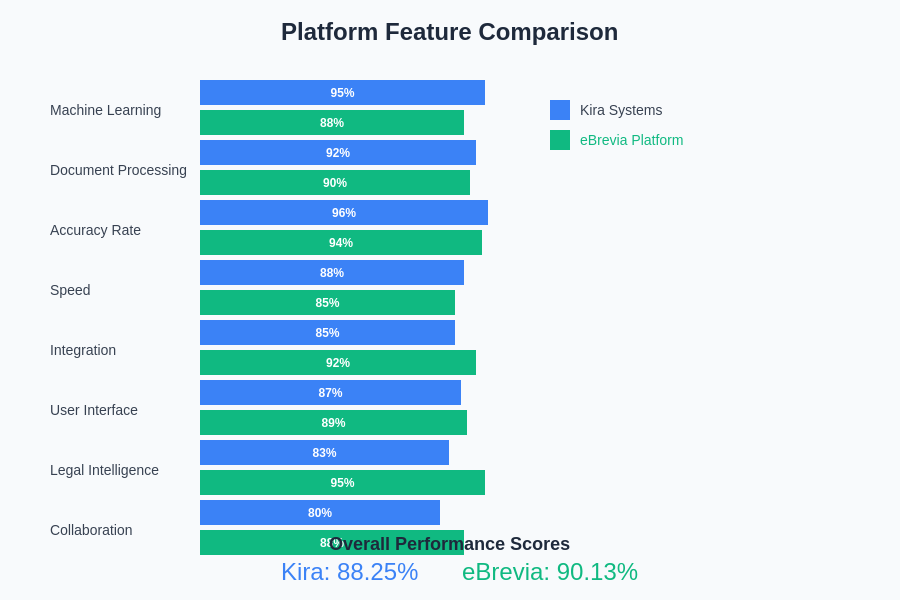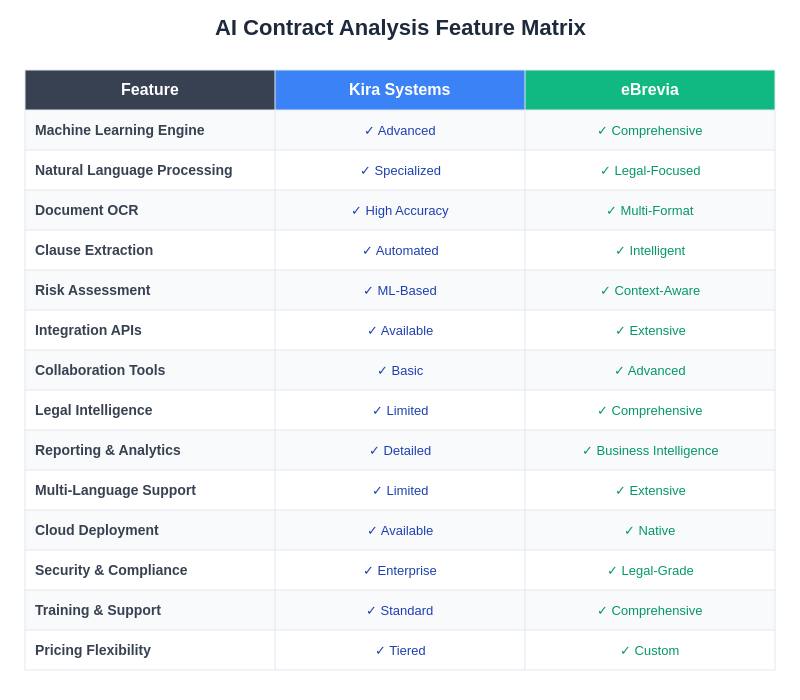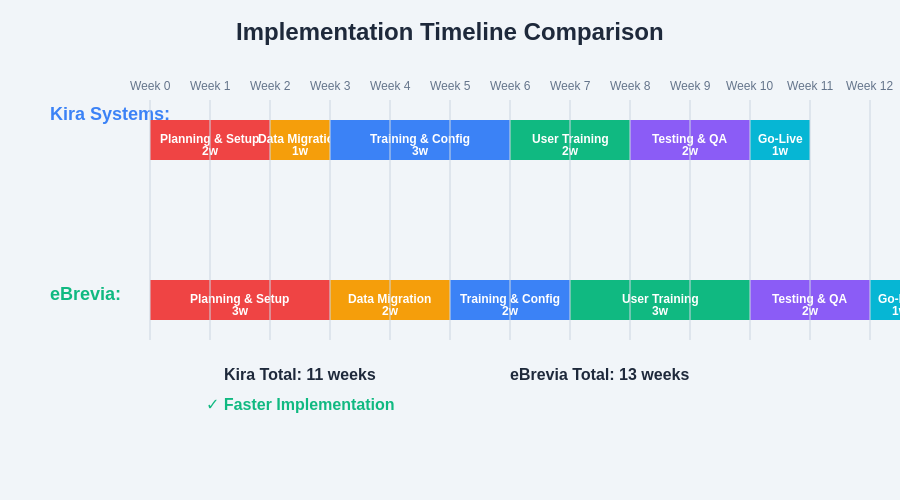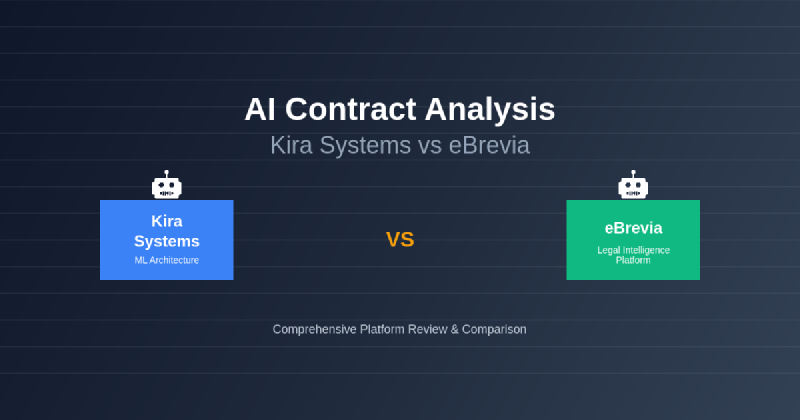The legal industry has undergone a profound transformation with the introduction of artificial intelligence-powered contract analysis platforms that revolutionize how legal professionals review, analyze, and manage complex contractual documents. Among the most prominent solutions in this rapidly evolving landscape are Kira Systems and eBrevia, two sophisticated platforms that have established themselves as industry leaders by leveraging advanced machine learning algorithms and natural language processing capabilities to deliver unprecedented efficiency and accuracy in contract analysis workflows.
Explore the latest AI innovations in legal technology to understand how artificial intelligence is reshaping traditional legal practices and creating new opportunities for enhanced productivity and precision. The emergence of these platforms represents not merely an incremental improvement in legal technology but a fundamental shift toward intelligent automation that empowers legal professionals to focus on higher-value strategic activities while ensuring comprehensive analysis of complex contractual arrangements.
The Evolution of Contract Analysis Technology
Traditional contract analysis has long been characterized by labor-intensive manual review processes that require extensive human resources, consume significant time, and remain susceptible to human error and inconsistency. The introduction of AI-powered contract analysis platforms has fundamentally transformed this paradigm by implementing sophisticated machine learning models capable of identifying, extracting, and analyzing contractual provisions with remarkable speed and precision that far exceeds human capabilities in terms of both throughput and consistency.
Kira Systems and eBrevia have emerged as pioneering solutions that demonstrate the transformative potential of artificial intelligence in legal document analysis. These platforms utilize advanced natural language processing algorithms, machine learning models trained on extensive legal document datasets, and sophisticated pattern recognition capabilities to deliver comprehensive contract analysis services that enable legal professionals to process larger volumes of contracts while maintaining higher standards of accuracy and thoroughness.
The competitive landscape between these platforms reflects broader trends in legal technology innovation, where the integration of artificial intelligence capabilities has become essential for maintaining competitive advantage in an increasingly complex and fast-paced legal environment. Both platforms have invested heavily in developing proprietary technologies that address the unique challenges of legal document analysis while providing intuitive user interfaces that facilitate adoption across diverse legal practice areas.
Kira Systems: Advanced Machine Learning Architecture
Kira Systems has established itself as a market leader through its sophisticated machine learning architecture that combines supervised learning techniques with advanced natural language processing capabilities specifically designed for legal document analysis. The platform’s core strength lies in its ability to continuously learn and improve its analysis accuracy through exposure to diverse contract types and legal document structures, creating a self-improving system that becomes more effective with increased usage and training data exposure.
The platform’s machine learning models are trained on extensive datasets encompassing millions of legal documents across various practice areas, enabling Kira to recognize complex contractual patterns, identify subtle legal nuances, and extract critical provisions with remarkable precision. This comprehensive training approach allows the system to handle diverse contract types, from simple commercial agreements to complex multi-party transactions involving sophisticated legal structures and specialized terminology.

The performance metrics demonstrate distinct strengths for each platform across various evaluation criteria, with both systems achieving exceptional results in their areas of specialization while maintaining competitive performance across all assessed dimensions.
Enhance your AI capabilities with advanced reasoning tools like Claude to complement contract analysis workflows with comprehensive research and analytical support that extends beyond document review to strategic legal planning and decision-making processes. The integration of multiple AI platforms creates a comprehensive legal technology ecosystem that addresses diverse aspects of modern legal practice.
Kira’s innovative approach to contract analysis includes proprietary algorithms that can identify and categorize contractual provisions based on legal significance, risk levels, and business implications. The platform’s advanced search capabilities enable users to locate specific clauses, terms, or concepts across large document collections using natural language queries that eliminate the need for complex search syntax or extensive manual filtering processes.
The system’s reporting and analytics capabilities provide comprehensive insights into contract portfolios, enabling legal teams to identify trends, assess risk exposure, and make data-driven decisions about contract management strategies. These analytical tools transform raw contract data into actionable business intelligence that supports strategic decision-making at both individual transaction and portfolio levels.
eBrevia: Comprehensive Legal Intelligence Platform
eBrevia distinguishes itself through its comprehensive legal intelligence platform that combines contract analysis capabilities with broader legal research and due diligence functionalities. The platform’s integrated approach enables legal professionals to conduct thorough contract reviews while simultaneously accessing relevant legal precedents, regulatory information, and market intelligence that provides crucial context for contract analysis and negotiation strategies.
The platform’s artificial intelligence engine utilizes sophisticated natural language processing algorithms specifically optimized for legal document analysis, enabling accurate identification and extraction of contractual provisions across diverse document types and legal jurisdictions. eBrevia’s machine learning models are continuously updated to reflect evolving legal standards, regulatory requirements, and market practices, ensuring that analysis results remain current and relevant to contemporary legal practice.
eBrevia’s strength lies in its ability to provide contextual analysis that goes beyond simple clause identification to offer insights into the legal and business implications of contractual provisions. The platform’s analytical capabilities enable users to assess risk levels, identify potential compliance issues, and evaluate the strategic implications of specific contractual terms within the broader context of applicable legal frameworks and industry standards.
The platform’s collaboration features facilitate team-based contract review processes by enabling multiple users to work simultaneously on document analysis projects while maintaining version control, tracking changes, and ensuring consistency across review activities. These collaborative capabilities are essential for large-scale due diligence projects and complex transactions involving multiple legal professionals and diverse areas of expertise.
Feature Comparison and Technical Capabilities
The comparison between Kira Systems and eBrevia reveals distinct approaches to contract analysis that reflect different philosophical perspectives on how artificial intelligence should be integrated into legal workflows. Kira Systems emphasizes deep machine learning capabilities and continuous improvement through exposure to diverse legal documents, while eBrevia focuses on providing comprehensive legal intelligence that integrates contract analysis with broader legal research and due diligence capabilities.
Both platforms offer sophisticated document processing capabilities that can handle various file formats, including PDF documents, Microsoft Word files, and scanned images through optical character recognition technology. The accuracy of text extraction and analysis across different document formats represents a critical factor in platform selection, particularly for organizations dealing with diverse document sources and varying quality levels.
Leverage comprehensive AI research capabilities with Perplexity to enhance contract analysis workflows with detailed legal research, regulatory compliance information, and market intelligence that provides essential context for informed decision-making. The combination of specialized contract analysis tools with comprehensive research platforms creates a powerful ecosystem for legal professionals.
The machine learning architectures employed by both platforms demonstrate different approaches to artificial intelligence implementation in legal technology. Kira’s emphasis on supervised learning and continuous model improvement through user feedback creates a system that becomes more accurate and effective over time, while eBrevia’s focus on comprehensive legal intelligence integration provides broader contextual analysis capabilities that extend beyond individual contract review to strategic legal planning.
Integration capabilities represent another critical differentiator between the platforms, with both offering API access and compatibility with popular legal technology solutions. The ability to integrate contract analysis capabilities into existing legal workflows and technology ecosystems significantly impacts user adoption and operational efficiency, making integration flexibility an important consideration for organizations evaluating these platforms.

The comprehensive feature analysis reveals how each platform addresses different aspects of contract analysis workflows, with specialized capabilities that reflect their distinct approaches to legal document processing and analysis.
Performance Analysis and Accuracy Metrics
The evaluation of contract analysis platform performance requires comprehensive assessment of accuracy metrics, processing speed, and user satisfaction across diverse use cases and document types. Both Kira Systems and eBrevia have demonstrated exceptional performance in independent evaluations and real-world implementations, though their specific strengths may vary depending on particular use cases and organizational requirements.
Accuracy in contract analysis encompasses multiple dimensions, including clause identification precision, provision extraction completeness, and contextual analysis reliability. Both platforms have achieved impressive accuracy rates in independent testing scenarios, with performance metrics often exceeding 95% accuracy for standard contractual provisions and maintaining strong performance even with complex or unusual document structures.
Processing speed represents another critical performance metric, particularly for organizations dealing with large document volumes or time-sensitive transactions. Both platforms have invested significantly in optimizing their processing algorithms and infrastructure to deliver rapid analysis results without compromising accuracy or thoroughness, though specific performance characteristics may vary based on document complexity and analysis scope.
User satisfaction metrics provide valuable insights into real-world platform effectiveness, encompassing factors such as ease of use, learning curve requirements, and integration with existing workflows. Both platforms have received positive feedback from legal professionals, though specific preferences may depend on individual practice areas, technical expertise levels, and organizational requirements.
Implementation Considerations and Best Practices
The successful implementation of AI-powered contract analysis platforms requires careful consideration of organizational requirements, technical infrastructure, and change management strategies that facilitate smooth adoption and maximize return on investment. Both Kira Systems and eBrevia offer comprehensive implementation support and training programs designed to ensure successful platform deployment and user adoption across diverse organizational contexts.
Data security and privacy considerations represent paramount concerns for legal organizations evaluating contract analysis platforms, given the sensitive nature of legal documents and strict confidentiality requirements governing legal practice. Both platforms have implemented robust security measures, including encryption protocols, access controls, and compliance certifications that meet stringent legal industry standards for data protection and privacy.
Training and change management represent critical success factors for contract analysis platform implementation, as legal professionals must develop new skills and adapt existing workflows to leverage AI capabilities effectively. Both platforms provide comprehensive training programs, user documentation, and ongoing support services that facilitate smooth transitions from traditional contract review processes to AI-enhanced workflows.
The integration of contract analysis platforms with existing legal technology ecosystems requires careful planning and technical expertise to ensure seamless data flow and workflow continuity. Both platforms offer integration capabilities and technical support services that facilitate smooth implementation within diverse technology environments, though specific requirements may vary based on existing infrastructure and integration complexity.

The implementation timeline comparison demonstrates how different platform architectures and deployment approaches affect project timelines, with variations in setup complexity, training requirements, and go-live processes that organizations should consider when planning their contract analysis initiatives.
Cost Analysis and Return on Investment
The financial evaluation of contract analysis platforms involves comprehensive assessment of total cost of ownership, including licensing fees, implementation costs, training expenses, and ongoing support requirements balanced against productivity improvements, accuracy enhancements, and risk reduction benefits. Both Kira Systems and eBrevia offer flexible pricing models designed to accommodate diverse organizational sizes and usage patterns.
The return on investment calculation for contract analysis platforms must consider both direct cost savings from reduced manual review time and indirect benefits such as improved accuracy, enhanced risk management, and increased capacity for handling larger document volumes. Organizations typically realize significant productivity improvements that justify platform investments within relatively short timeframes, particularly for firms handling substantial contract volumes.
Scalability considerations play important roles in cost analysis, as organizations may need to accommodate changing document volumes, user requirements, and feature needs over time. Both platforms offer scalable solutions that can adapt to evolving organizational requirements, though specific scalability characteristics and associated costs may vary based on particular implementation approaches and usage patterns.
Industry Applications and Use Cases
The versatility of modern contract analysis platforms enables their application across diverse legal practice areas and industry sectors, each presenting unique requirements and challenges that benefit from AI-powered analysis capabilities. Both Kira Systems and eBrevia have demonstrated effectiveness across various application scenarios, from mergers and acquisitions due diligence to ongoing contract portfolio management and compliance monitoring.
Mergers and acquisitions transactions represent one of the most demanding applications for contract analysis platforms, requiring rapid processing of large document volumes while maintaining exceptional accuracy in identifying critical provisions, potential liabilities, and compliance issues. Both platforms have proven effective in supporting complex M&A transactions by enabling legal teams to conduct thorough due diligence reviews within compressed timeframes while maintaining comprehensive coverage of material contract terms.
Real estate transactions benefit significantly from AI-powered contract analysis capabilities, particularly for large portfolio acquisitions or complex commercial real estate deals involving multiple properties and diverse contract types. The ability to quickly identify and analyze lease terms, maintenance obligations, tenant rights, and other critical provisions enables more efficient transaction execution and better-informed investment decisions.
Corporate legal departments utilize contract analysis platforms for ongoing portfolio management, compliance monitoring, and risk assessment activities that require regular review of large contract collections. The platforms’ ability to identify contract renewal dates, compliance requirements, and potential risk factors enables proactive contract management that reduces legal exposure and improves operational efficiency.
Future Developments and Technology Evolution
The contract analysis platform landscape continues to evolve rapidly as artificial intelligence technologies advance and legal industry requirements become more sophisticated. Both Kira Systems and eBrevia are actively developing enhanced capabilities that will further expand their analytical power and broaden their application scope within legal practice environments.
Machine learning algorithm improvements promise to deliver even higher accuracy rates and expanded capability for handling complex legal concepts, specialized terminology, and nuanced contractual provisions. The continuous evolution of natural language processing technologies will enable more sophisticated understanding of legal context and improved ability to identify subtle relationships between contract provisions and broader legal frameworks.
Integration capabilities will continue to expand as legal technology ecosystems become more interconnected and comprehensive. Future developments will likely include enhanced compatibility with legal research platforms, document management systems, and workflow automation tools that create seamless end-to-end legal technology solutions.
The expansion of analytical capabilities beyond basic contract review to include predictive analytics, risk assessment modeling, and strategic planning support represents an exciting frontier for contract analysis platform development. These advanced capabilities will enable legal professionals to leverage historical contract data and market intelligence to make more informed decisions about negotiation strategies, risk management approaches, and business development opportunities.
The democratization of advanced contract analysis capabilities through improved user interfaces, reduced technical complexity, and expanded accessibility will enable broader adoption across diverse legal practice environments. These developments will make sophisticated AI-powered analysis tools available to smaller legal organizations and individual practitioners who previously lacked access to such advanced capabilities.
Conclusion and Strategic Recommendations
The comparison between Kira Systems and eBrevia reveals two exceptional platforms that represent the cutting edge of AI-powered contract analysis technology, each offering distinct advantages and capabilities that serve different organizational needs and strategic objectives. The selection between these platforms should be based on careful evaluation of specific requirements, technical infrastructure, budget considerations, and long-term strategic goals rather than simple feature comparisons.
Organizations prioritizing deep machine learning capabilities, continuous improvement through usage, and specialized contract analysis features may find Kira Systems particularly well-suited to their needs. The platform’s emphasis on sophisticated AI algorithms and extensive training datasets creates a powerful tool for organizations requiring the highest levels of accuracy and analytical depth in contract review processes.
Conversely, organizations seeking comprehensive legal intelligence capabilities that integrate contract analysis with broader legal research and due diligence functions may prefer eBrevia’s integrated approach. The platform’s emphasis on contextual analysis and comprehensive legal intelligence provides valuable additional capabilities that extend beyond basic contract review to support broader legal strategy development and implementation.
The future of contract analysis technology promises continued innovation and capability expansion that will further enhance the value proposition of AI-powered legal technology solutions. Legal professionals and organizations that invest in these advanced capabilities today will be well-positioned to capitalize on future developments while gaining immediate benefits from current platform capabilities.
The successful implementation of contract analysis platforms requires commitment to change management, user training, and process optimization that maximizes the return on technology investments. Organizations that approach platform adoption with comprehensive planning and dedicated implementation support will realize the greatest benefits from these powerful AI-powered legal technology solutions.
Disclaimer
This article is for informational purposes only and does not constitute professional legal or technology advice. The views expressed are based on publicly available information and general industry knowledge about contract analysis platforms. Readers should conduct their own thorough evaluation and consider their specific requirements when selecting legal technology solutions. Platform capabilities, features, and performance metrics may vary based on specific implementation approaches and usage patterns. Organizations should consult with qualified legal and technology professionals before making technology investment decisions.
